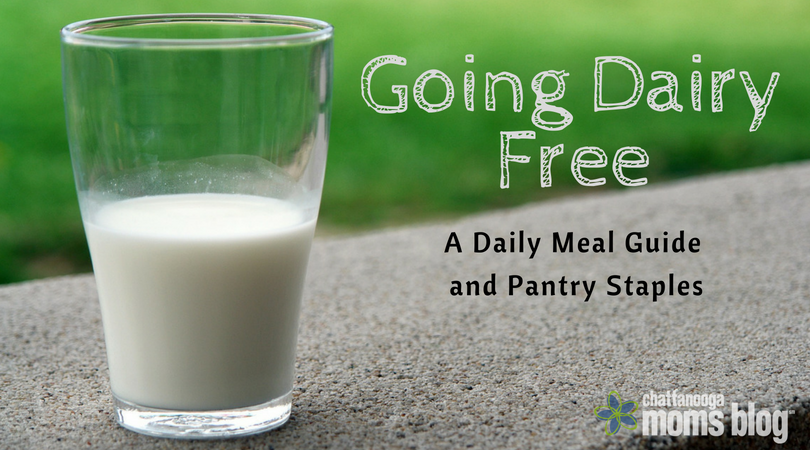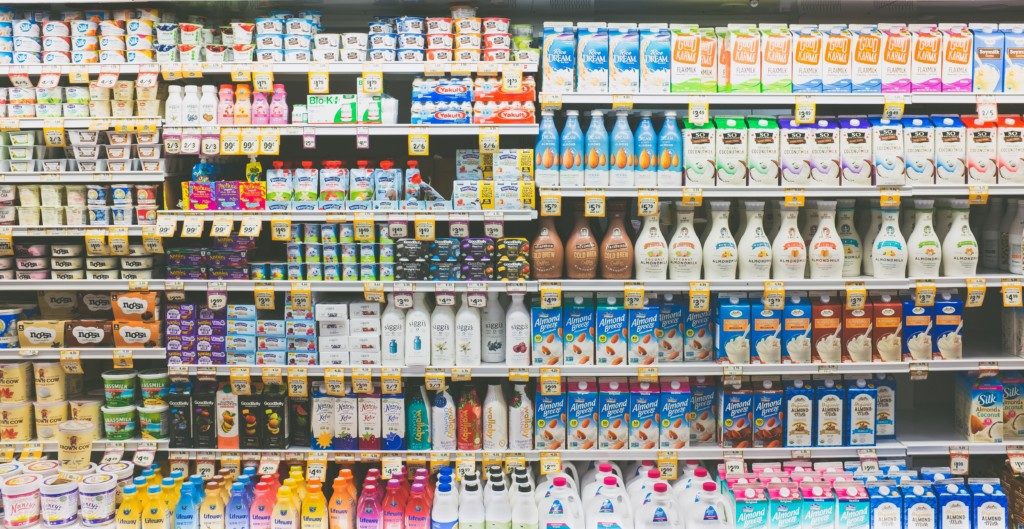We grew up being taught that dairy was a vital source to grow big and strong, right? If that’s the case, then why are so many babies (and adults) sensitive to the protein found in cow’s milk?

I had this question, and many more, when I finally had an answer after finding blood in my colicky newborn’s stool. Her pediatrician recommended I eliminate all forms of dairy, casein, and whey since I wished to continue breastfeeding, or I could spend a small fortune on hypoallergenic formula.
After 6-8 weeks of being dairy free and experiencing a completely different baby, it led me on a discovery health journey that changed my entire family’s diet.
Eliminating dairy can be a daunting task for a typical American diet. Dairy is found in the majority of processed and quick service foods, even Diet Coke! Without the right resources, it can feel like all you can eat is lettuce and celery everyday, but that’s just not the case. Once you discover all of the whole foods and spices that make up for a well-balanced, healthy, flavorful diet that will not only help your baby but will change the way you look and feel, it is totally worth the elimination. My daughter is almost 15 months now and no longer has a dairy sensitivity, but we still continue the dairy-free life as much as we can for a number of health benefits.
After being dairy-free for a year, I’ve gathered several tips to easily living dairy-free:

Breakfast
While nursing, you want to make sure you consume plenty of calories in order to keep up your milk supply. Many of your calories probably come from dairy-derived foods, so you need to be conscious about packing your meals with calories found from nuts and whole grains.
Our favorite breakfast is quick oats with all the fixings (almond butter, walnuts, chia seeds, fruit, granola, and a touch of real maple syrup. I just serve it plain with a little unsweetened applesauce to my daughter.)
aWe also eat whole grain cereals, scrambled eggs, or our favorite pancakes or French toast. We also like the Simple Mills Pancake Mix for a quick alternative.
Note: I substitute almond milk for any recipe that calls for regular milk. There are many nut milks to choose from for your preference.
Lunch/Dinner
We often eat leftovers for lunch, so I try to make large dinners with this in mind. The simple thing to remember when preparing a meal is to cook with whole foods and try to eliminate anything that comes processed in a box. Basically, read the ingredients on everything you get. If it has items that you’ve never heard of or is a list of more than 5-10 ingredients, it might not be the best choice. More specifically, if you see the words, “contains milk or lactose” or any milk derivatives such as caramel color or natural flavoring (these are the sneaking dairy culprits) on the package, then you need to avoid those items if there’s a specific allergy or sensitivity. This document is very helpful when grocery shopping!

I get the majority of my recipes from Minimalist Baker, Oh She Glows, and Paleo Running Momma. These food blogs are either plant-based or paleo; the only difference between the two is that paleo diets include meat and eggs but no gluten, and plant-based includes whole grains (gluten) but no meat or eggs. Either way, both diets exclude dairy.
Here are a few of my favorite weeknight meals:
Snacks
I keep my snacks simple. I either go for raw nuts, fruit, almond butter toast on sprouted bread, Lara bars, or a protein smoothie.
Orgain is my favorite protein powder. It’s dairy, gluten, and soy free and doesn’t taste powdery or like chemicals at all. Be Well by Kelly has some of the best smoothie recipes out there for a well-balanced diet.
Dessert
Having a sweet tooth can make a dairy free diet sound miserable. I refused to ignore my sweet tooth, so I’ve found some awesome recipes and items that have satisfied my craving.
Two of my favorite go-to sweets are Ben & Jerry’s Dairy-Free ice cream and Moser Roth dark chocolate bars found at Aldi.
Here are a few of my favorite recipes:
Toffee Cinnamon Oatmeal Cookie Bar
Pantry Staples
A few items that I always keep on hand are:
Earth Balance Vegan Butter (I can’t taste a difference, and it can easily be substituted in recipes calling for dairy butter.)
Enjoy Life Chocolate Chips (dairy and soy free)
Almond milk (unsweetened vanilla or original)
Nuts, nut butters, whole grains, and beans (these bulk up meals and add good calories and vitamins to your diet)
Nutritional yeast (this gives meals a cheesy flavor)
Dining Out
Dining out can be the hardest part of a dairy-free or plant-based diet. My best tip is to always ask for an allergen menu. If your waiter doesn’t know what you’re talking about, then ask for the manager. You always want to ask if the meal is cooked in butter; if it is, ask that it be cooked in oil instead, and always ask for no cheese. If all else fails, just ask for the vegan option.
A few of my go-to Chattanooga restaurants are Panera, Southern Sqweeze, Lupi’s (no cheese veggie pizza), and Cashew’s vegan donuts!






















Thanks for putting this out there! There are so many false misconceptions about dairy still! I used to be much better, I need to get back into the dairy free lifestyle!
I would love it if you could share some of your research references. Especially pertaining to the caramel coloring and natural flavorings.
Sorry for the late reply. I don’t have a specific link to the information about caramel coloring and natural flavors. My daughter’s pediatrician went in depth with me about what going dairy free actually means and gave me a 4 page hard copy resource with ingredients to avoid and those two are the sneaky ones that so many people don’t know about.
This is golden information! My husband is dairy free, and the whole family is headed that way. No longer nursing, but know I can pass this on to some Mommas!
Comments are closed.